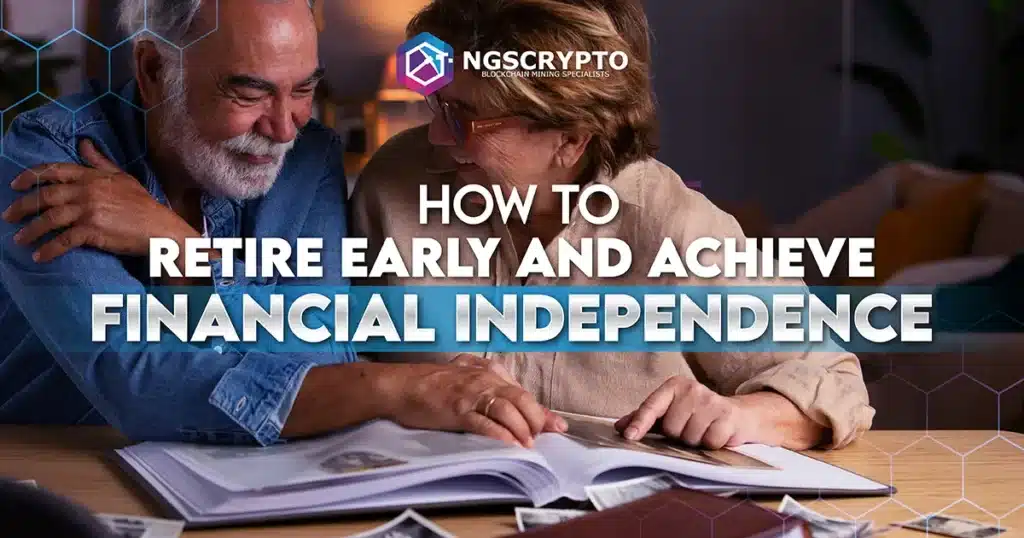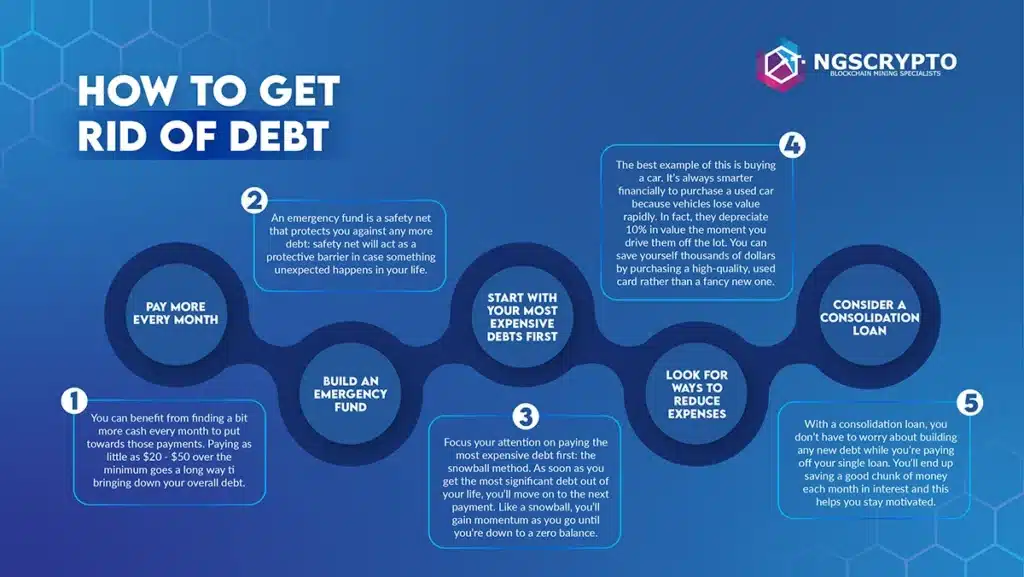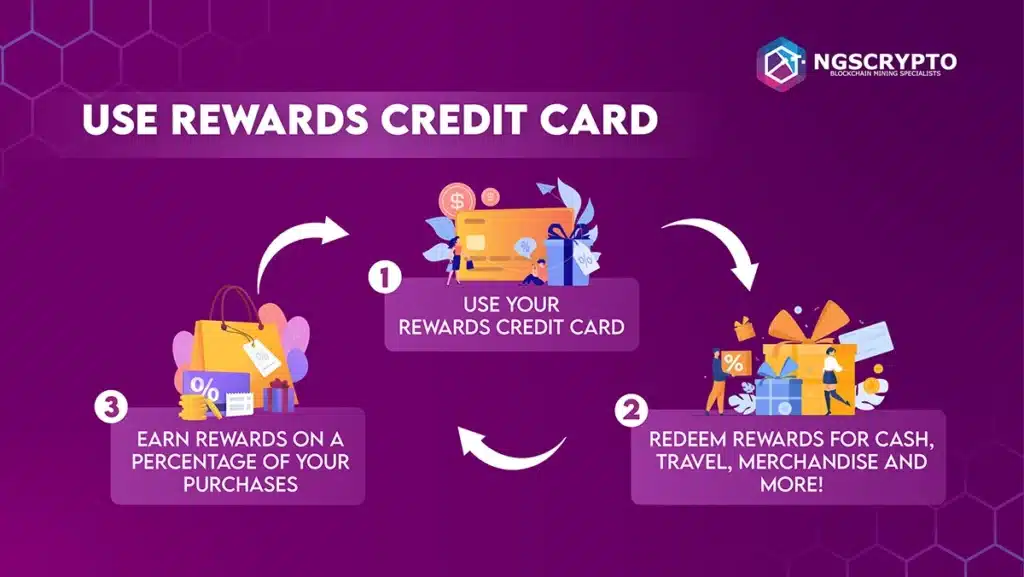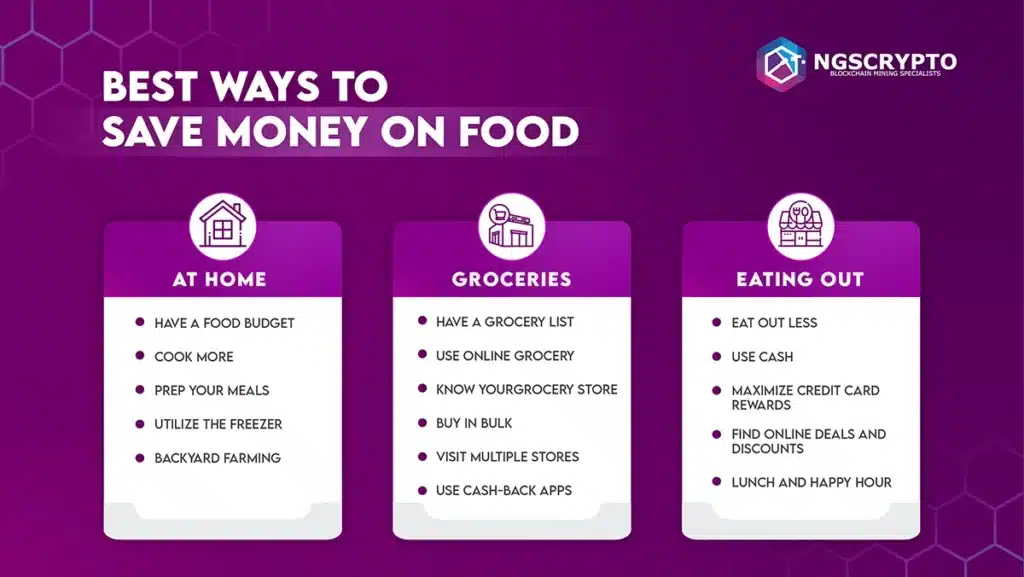NGS Crypto is an Authorised Reseller of NGS Group Blockchain Mining Packages
NGS Crypto is an Authorised Reseller of NGS Group Blockchain Mining Packages


Written by Katya Richardson
Share this article
In a world where most people wait a long time to retire, there’s a group of people doing things differently. They’re part of the FIRE movement, which stands for “Financial Independence, Retire Early.” This movement started in the United States but is gaining popularity in Australia too. It all began with a book called “Your Money or Your Life” by Vicki Robin and Joe Dominguez back in 1992.
FIRE is all about saving a big chunk of your money – as much as 70% of what you earn. But it’s not just about being super tight with your spending. It’s also about getting rid of all your debts, including your mortgage, and making smart investments in low-cost funds that follow the stock market.
So, what’s the big idea? The FIRE movement believes you can retire much earlier than most people think if you follow their plan. It’s not just about money; it’s about having the freedom to live life on your terms.
In this article, we’ll take a closer look at the FIRE movement and discuss the simple yet powerful strategies that can help you achieve financial independence and retire early.
Many followers of the Fire movement use key strategies to help them build up their financial independence, so they can have more flexibility with time and build a meaningful passion-filled life. Here is the step-by-step:
High-interest debts like credit cards or personal loans, can be a significant hurdle on your journey toward financial independence. When you carry debts, a significant portion of your income is directed toward covering interest and principal payments, which leaves you with less money to allocate towards investments and savings for the future.
By effectively managing your financial challenges and eradicating debt, you can not only enjoy a notable reduction in stress but also bolster your ability to make the most of your savings. Here’s a valuable tip to expedite your debt repayment: seek additional sources of income, cut down on expenses, and prioritize paying off high-interest debts first (such as student loans, credit cards, or mortgage loans).
While paying off debt is crucial, it’s equally important to start planning for retirement early. Learn about the basic tips to start retirement planning.

Maintaining a positive and practical attitude toward money is essential for achieving FIRE. This mindset helps to make smart financial decisions, like saving and investing wisely. It also empowers them to overcome obstacles like fear of investing or the temptation of immediate rewards.
To develop this growth-oriented mindset, you can set realistic goals, stay positive and mindful, learn from your financial mistakes, and manage your budgets wisely. In summary, a positive and practical approach to money is key to pursuing FIRE successfully, as it enables informed decisions and resilience in the face of financial challenges.
Housing is a major expense for many Australians, driven by its essential role, limited availability in high-demand areas, and the usual long-term commitment involved. This financial obligation includes not only mortgage or rent payments but also ongoing costs like property maintenance, council rates, and utility bills.
To ease the load of housing expenses, you have several strategic options. For example, downsizing to a smaller home or opting to rent can effectively reduce monthly housing costs. You can also rent out extra units within your property to offset expenses or co-living arrangements and sharing living spaces with roommates offers cost-effective alternatives, though they may come with potential trade-offs in privacy and personal freedom.
When choosing the best approach for your situation, conducting a thorough financial assessment is vital. Consider factors like your income, savings, and outstanding debts. Long-term financial goals, lifestyle preferences, and the cost of living in your chosen location also significantly influence your decision.
Cars are a major financial commitment for many people due to various factors. Firstly, the initial costs of purchasing a car, whether new or used, can be substantial. This often includes a down payment or the full purchase price. Secondly, cars typically depreciate over time, and this depreciation can be particularly steep for new vehicles, resulting in a loss of value and financial investment. Additionally, ongoing expenses such as car insurance premiums, routine maintenance, and unforeseen repairs can add up, making car ownership a continuous financial responsibility.
To save money on car ownership, you can consider the following strategies: Opt for a used car rather than a brand-new one, as they often provide better value for money due to slower depreciation. If possible, pay for the car in cash to avoid interest charges associated with loans. Regularly servicing and maintaining your vehicle can help prevent costly repairs and extend its lifespan. By implementing these measures and avoiding car loans, you can reduce the overall cost of car ownership, making it a more manageable expense.
Rewards credit cards let you earn rewards like cash back, points, or miles when you use your card for shopping. These cards have different ways of giving rewards, with some offering a fixed percentage back on everything you spend and others giving more for certain types of spending, such as dining or groceries. Keep in mind that some rewards cards charge an annual fee, so it’s a good idea to check if the rewards you’ll earn make it worth the cost.

Here are a few examples of good rewards credit cards in Australia:
Remember, the right rewards card for you depends on your spending habits, so pick one that suits you best. In this way, you can use all the rewards and save more money.
Managing your food and grocery expenses can be a real challenge in your budget. There are a few reasons for this. Firstly, you have to spend money on food regularly because it’s a necessity. Also, the prices of food can go up and down due to things like inflation and problems with the supply chain. This means your grocery bills can vary from month to month.
To save money on your food and grocery costs, here are some practical ideas: First, plan your meals for the week and make a list before you go shopping. This can help you avoid buying things you don’t need and reduce the amount of food you throw away. Second, cooking at home is usually cheaper than eating out, and it gives you more control over how much you eat and what goes into your food. Finally, When you can, better to buy things in bulk, look for discounts and use coupons, and compare prices and brands to find the best deals.

Subscriptions can quickly drain your finances and time if not managed wisely. Whether it’s streaming services or gym memberships, those monthly fees add up fast, and unused subscriptions become a waste of money. Moreover, excessive screen time, like endless TV watching or mindless scrolling, eats away at your productivity. To save both money and time, simplify your choices.
Stick to a couple of favourite streaming services, make use of free trials, and tap into your local library’s free resources. Bundling services can also cut costs. By reducing screen time and pursuing enjoyable hobbies, you can boost productivity, enhance physical and mental well-being, and keep more money in your pocket while striking a better balance between screens and real-life experiences.
Taxes can take a big chunk out of your income and savings. Income tax, capital gains tax, and other taxes can reduce what you earn and save. To help save money on taxes, consider using accounts that defer taxes. A 401(k) is a retirement account you can get through your employer. You put money in before tax, so your taxable income is lower. The money grows without being taxed until you take it out in retirement.
There are also Individual Retirement Accounts (IRAs), like traditional and Roth IRAs, that give tax benefits. Health Savings Accounts (HSAs) are great for medical costs. The money you put in is pre-tax, and if used for medical expenses, it’s tax-free. Other options like 529 Plans for education expenses and employer stock purchase plans can also help you save on taxes. To get the most from these accounts, it’s smart to talk to a financial advisor or tax expert before making any decisions.
Investing is like the engine that powers your wealth growth and helps you reach FIRE. It’s essential for a few reasons. First, it allows your money to grow over time through compounding, which means your investments earn more money on the returns they’ve already made. Second, it helps you stay ahead of inflation, so your money keeps its value.
To succeed with FIRE through investing, you need to remember a few things. Diversification is vital; it means spreading your investments across different types of things so that if one doesn’t do well, the others can still make money. Keeping a long-term view is also crucial because investing for FIRE takes time. It’s about being patient and not panicking when the markets go up and down. Finally, understand how much risk you’re comfortable with, keep putting money into your investments regularly, and keep learning about how it all works.
Keeping track of your progress and making necessary changes is crucial when aiming for FIRE. Think of it as a roadmap for your finances. It helps you see how far you’ve come and if you’re on the right path. Tracking also lets you spot problems early, like overspending or a drop in investments, so you can fix them before they derail your FIRE plans. Plus, watching your progress can motivate you to stay committed to your goals.
To make this journey easier, you can use tools like spreadsheets, budgeting apps, and investment tracking apps. You can also find guidance and inspiration from FIRE blogs and podcasts. Financial calculators can help you understand how you’re doing and if you need to make any changes. It’s also crucial to know that factors like rising prices, ups and downs in the market, and life events can affect your FIRE plans. So, stay flexible and be ready to adapt your strategy as needed to stay on track towards financial independence and early retirement.
Starting your journey towards Financial Independence and Early Retirement (FIRE) can transform your future, offering freedom and financial security. We’ve covered the 10 essential steps to begin, so let’s take the first step now.
The sooner you begin, the more you’ll benefit from compound interest. Picture a life where you can follow your passions, spend time with loved ones, and feel financially secure. This dream can come true by saving, spending wisely, and investing carefully.
Embarking on the FIRE journey is commendable. But remember, while achieving financial independence is the goal, avoiding common mistakes is just as critical. Dive deeper into our Top 5 Biggest Retirement Planning Mistakes to ensure you’re on the right path.
Make a promise today: take action, set clear goals, budget, save, invest wisely, and keep learning. Seize the opportunity, and start building your financially independent future today.
The information presented on this website is general information only. It should not be taken as constituting professional advice from the website owner – NGS Crypto PTY LTD (NGS Crypto). Any information regarding past performance and returns contained on this website should not be construed or interpreted as a prediction or opinion as to future performance and returns. NGS Crypto is not a financial adviser. All views and observations expressed by NGS Crypto on this website are for information purposes only, are general in nature and should not be treated as investment or financial advice of any kind.
NGS Crypto is an authorised reseller of NGS Group blockchain mining packages. The information presented on this website (https://ngscrypto.com) is general information only. It should not be taken as constituting professional advice from the website owner – NGS Crypto PTY LTD (NGS Crypto). Any information regarding past performance and returns contained on this website should not be construed or interpreted as a prediction or opinion as to future performance and returns. NGS Crypto is not a financial adviser. All views and observations expressed by NGS Crypto on this website are for information purposes only, are general in nature and should not be treated as investment or financial advice of any kind. Before making an investment in crypto assets, you should consider seeking independent legal, financial, taxation or other such professional advice to check how the information on this website relates to your unique circumstances. NGS Crypto is not liable for any loss caused, whether due to negligence or otherwise arising from the use of, or reliance on, the information provided directly or indirectly, by use of this website. You can view our full terms & conditions by clicking here.
NGS Crypto is not affiliated, associated, authorized, endorsed by, or in any way officially connected with this NGS Super (ABN 73 549 180 515).
© 2024 NGS Crypto
NGS Crypto is an Authorised Reseller of NGS Group
| Cookie | Duration | Description |
|---|---|---|
| cookielawinfo-checkbox-analytics | 11 months | This cookie is set by GDPR Cookie Consent plugin. The cookie is used to store the user consent for the cookies in the category "Analytics". |
| cookielawinfo-checkbox-functional | 11 months | The cookie is set by GDPR cookie consent to record the user consent for the cookies in the category "Functional". |
| cookielawinfo-checkbox-necessary | 11 months | This cookie is set by GDPR Cookie Consent plugin. The cookies is used to store the user consent for the cookies in the category "Necessary". |
| cookielawinfo-checkbox-others | 11 months | This cookie is set by GDPR Cookie Consent plugin. The cookie is used to store the user consent for the cookies in the category "Other. |
| cookielawinfo-checkbox-performance | 11 months | This cookie is set by GDPR Cookie Consent plugin. The cookie is used to store the user consent for the cookies in the category "Performance". |
| viewed_cookie_policy | 11 months | The cookie is set by the GDPR Cookie Consent plugin and is used to store whether or not user has consented to the use of cookies. It does not store any personal data. |